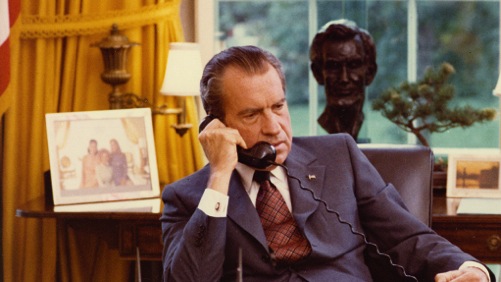Caught on tape and amplified anew: HBO's Nixon By Nixon: In His Own Words marks another resignation anniversary
08/04/14 09:26 AM

Richard Nixon in the Oval Office while bust of Abe Lincoln looks on. HBO photo
By ED BARK
@unclebarkycom on Twitter
Other presidents perhaps have said worse, but not for all to hear.
HBO’s latest In His Own Words documentary is an oral history of Richard Nixon timed to coincide with the 40th anniversary of his Aug. 9, 1974 resignation of the presidency at the height of the Watergate scandal. Nixon By Nixon (premiering on Monday, Aug. 4th at 8 p.m. central), does not suffer from a lack of material. It easily could stretch well beyond the allotted 75-minute running time, with 3,700 hours of Oval Office recordings to choose from in addition to Nixon’s other interviews with the news media he so detested.
Others are heard from as well, including former chief domestic advisor John Ehrlichman. He was one of many to be unaware of his boss’s taping mechanism, utilized from 1971 to ’73 as a means of preserving history. Ehrlichman, who died in 1999, hopes that a “committee of historians” someday will listen to all of the tapes before drawing their conclusions about Nixon. They’d come away seeing him as “the strangest paradoxical combination of any man I ever heard of. And they’d be right,” Ehrlichman says.
Most of the flash points in Nixon By Nixon are from his taped conversations. They’re skillfully illustrated and subtitled, although most of the audio is crystal clear. Nixon’s views, then and now, are often jarring.
“The Jews are born spies,” he says of Daniel Ellsberg’s leaking of The Pentagon Papers. “Most Jews are disloyal. Generally speaking, you can’t trust the bastards. They turn on you.”
Discussing his intention to name Romana Banuelos as treasury secretary, Nixon says that Mexicans at least “don’t live like a bunch of dogs, which the Negroes do live like. We’re gonna put more of these little Negro bastards on the welfare rolls at twenty-four hundred dollars a family.”
The major networks at the time -- CBS, NBC and ABC -- were fouled by anchors and reporters out to get him, Nixon tells special counsel Charles Colson, another of those who didn’t know they were being taped. “There’s not a good one on the whole Goddamn three networks. Not one.”
Nixon then ticks off the names of Walter Cronkite, Dan Rather, Harry Reasoner, John Chancellor, Daniel Schorr and Eric Sevareid as some of his principal antagonists.
Rather, the only current-day survivor of this group, is “just a sonofabitch, don’t you think?” he asks Colson.
Colson agrees, adding that Rather is also a “bastard.”
Nixon is more cordial in conversations with his wife, Pat, and daughter, Julie. But although friendly, their exchanges are also perfunctory. The president obviously had a lot on his mind. So when Tricia happily asks him about going to Trader Vic’s for a family dinner, he agrees without any extended chit-chat. Julie quickly signs off, seeming to know when their “conversation” has run its course.
Although the Watergate era does not lack for publicity, it’s easy to forget some of Nixon’s more striking on-camera moments. Introducing the Ray Coniff Singers for a performance at the White House, he tells the gathering, “And if the music is square, it’s because I like it square.”
But he doesn’t account for Carole Feraci, a Coniff singer with an agenda. She has both a sign -- “Stop the Killing” -- and a stream of verbiage that includes, “President Nixon, stop bombing human beings, animals and vegetation … If Jesus Christ were here tonight, you would not dare to drop another bomb.”
Amazingly, the performance then begins as if nothing untoward had happened, with Feraci joining her mates in singing the very square “Ma, He’s Making Eyes at Me.”
The following day, on a White House tape, Nixon calls her “the bitch.”
Near the end, he also lets his contempt for the media flare up at a White House press conference. Told by one reporter that he seemed to be angry at the coverage of his administration, the president says with a smile, ”One can only be angry with those he respects.”
Nixon By Nixon is produced and directed by Peter Kunhardt, whose work for HBO also includes oral histories of John, Robert and Edward Kennedy, and Gloria Steinem. And although it’s been told many times many ways, Kunhardt’s up-close look at the only American president ever to resign from office is absorbing from its opening minutes to the dark denouement.
Nixon, who died in 1994 and fought against his tapes going public, says in a table-setting interview that he went into politics after dropping what seemed to be a promising musical career.
“Sometimes I rather regret it,” he adds.
So do those of us who lived through Nixon’s life, times, prejudices and deceptions, which are amplified anew in this anniversary week by the tapes he came to see as a “probably stupid” idea.
GRADE: A-minus
Email comments or questions to: unclebarky@verizon.net
